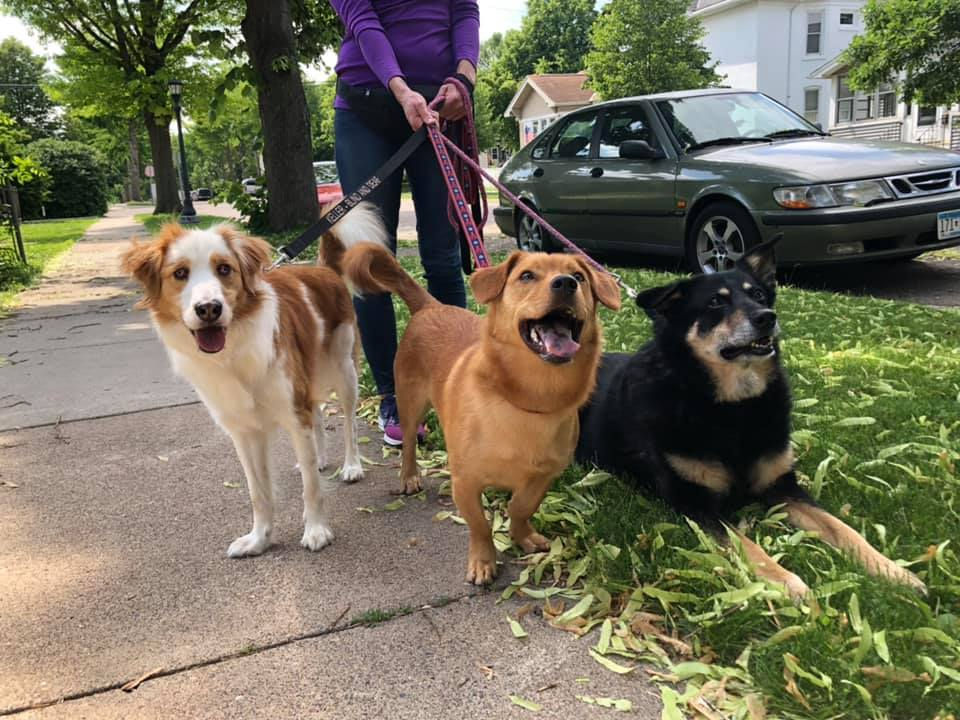Tips for Helping Dogs with Separation Anxiety through Regular Walks
- Breanna Pederson

- Oct 17, 2023
- 3 min read
Updated: Oct 29, 2023
Introduction
Separation anxiety in dogs is a common issue that can lead to destructive behavior and emotional distress for both pets and owners. Fortunately, one effective way to help dogs cope with separation anxiety is through regular walks. In this comprehensive guide, we will explore the importance of walking for anxious dogs and provide valuable insights and tips to ensure both you and your canine companion enjoy the benefits of this simple yet powerful remedy.
The Power of Consistent Dog Walks
Why Walks Matter
Walking is more than just a physical activity for dogs; it's a mental and emotional outlet. It allows them to explore their surroundings, interact with other dogs, and release pent-up energy. For dogs with separation anxiety, daily walks can offer a sense of routine and predictability, reducing anxiety triggers.
The Role of Exercise
Regular exercise during walks helps dogs release endorphins, which are natural mood enhancers. It can significantly reduce stress and anxiety levels, making your dog calmer and more content when you're away.
Building Trust
Walking with your dog strengthens the bond between you. It fosters trust and reinforces your role as their protector, which can boost their confidence and alleviate anxiety when you're not around.
Incorporating Regular Walks into Your Routine
Establishing a Schedule
Consistency is key when addressing separation anxiety. Set a daily walking schedule that aligns with your dog's needs and stick to it. Predictability can help ease their anxiety.
Proper Walking Techniques
Utilize positive reinforcement during walks to reward good behavior. Encourage your dog to walk calmly beside you, rewarding them with treats and praise. This positive experience will make them look forward to daily walks.
Exploring New Environments
Variety is essential. Take your dog to different locations to stimulate their senses and keep walks engaging. New experiences can be enriching and distracting, helping your dog forget about their anxiety.
Addressing Specific Anxiety Triggers
Noise Sensitivity
If your dog is sensitive to noise, choose quieter walking routes, and consider using noise-canceling earmuffs designed for dogs. Gradual desensitization can also help reduce their sensitivity over time.
Separation-Related Destructiveness
To prevent destructive behavior when left alone, ensure your dog is tired from a walk before you go. Provide puzzle toys or treat-dispensing devices to keep them occupied during your absence.
Frequently Asked Questions
Q: How often should I walk my dog to help with separation anxiety?
A: Ideally, aim for at least one long walk daily, but it may vary depending on your dog's breed and age. Consult your vet for personalized recommendations.
Q: Can I hire a dog walker if I can't walk my dog regularly?
A: Yes, a professional dog walker can be a great solution if your schedule doesn't allow for daily walks. Ensure they understand your dog's anxiety and follow your guidelines.
Q: What if my dog refuses to walk or becomes anxious during walks?
A: Start with short, low-pressure walks, gradually increasing the duration. Use positive reinforcement to encourage them. If anxiety persists, consult a dog behaviorist.
Q: Should I walk my dog before or after leaving for work?
A: It's best to walk your dog before leaving to tire them out and reduce anxiety. After-work walks are also beneficial but should not replace the morning walk.
Q: Is it okay to walk my dog during extreme weather conditions?
A: In extreme heat or cold, prioritize your dog's safety. Shorten walks or find indoor alternatives to ensure their comfort and well-being.
Q: Can I leave my dog alone after a walk immediately, or should there be a transition period?
A: Allow a brief transition period after returning from a walk to help your dog settle. Gradually increase the time they spend alone over days or weeks.
Conclusion
Helping dogs with separation anxiety through regular walks is a rewarding journey for both pet and owner. By understanding the positive impact of walking, incorporating it into your routine, and addressing specific triggers, you can significantly improve your dog's well-being and your peace of mind. Remember, patience and consistency are key to success in alleviating separation anxiety in your furry friend.





Comments